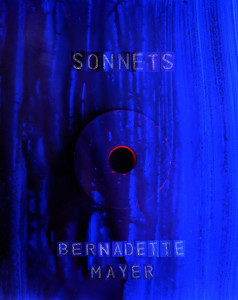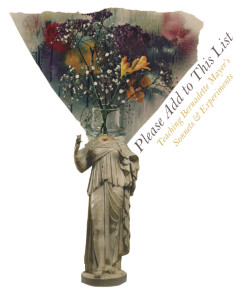

Bernadette Mayer
Sonnets + Please Add To This List
Tender Buttons, 2014
Twenty-five years ago, as the press Tender Buttons began handing out copies of their first book, Bernadette Mayer’s Sonnets, my blue-collar mother was giving birth to me in a smallish hospital in Oberlin, Ohio, a few blocks away from where I would learn how to play and one day hate the piano.
*
I first learned about Bernadette Mayer shortly after meeting Laynie Browne at the Naropa Institute Summer Writing Program. Laynie led a discussion on the chapbook form that was filled with so much love, compassion, and urgency I left the talk early so I could cry. I bought Laynie’s Daily Sonnets, which includes several references to Mayer. Having not read much experimental work at this point, Laynie Browne and Bernadette Mayer became my foundation. It was from reading these poems that I stopped being a poet and started being a sonneteer.
*
I wanted to start there to give some context to how I entered Sonnets. Then, as a 20 year old in college, and now as a 25 year old just out of graduate school. I’ve tried writing this in various forms, not wanting to think of it as a “review” but rather a celebration.
*
I have read excerpts from Sonnets in almost every poetry workshop I’ve taken. Reading Sonnets on its 25th anniversary with purpose the summer I turned 25 feels as surreal as walking around a museum containing the artifacts of my life that are dearest to me.
*
In her investigation of self, Mayer pries open the body to see where it hurts. “The Earthworkers’ God is Healed” summons “Two socialists I loved” who by the end of the poem have transformed into “Those two green birds who bite my fingers / Till I scream for identical help.” Like many of the characters in Sonnets, the socialists aren’t forgotten; they’re recycled energies. Mayer demands we forget them and rallies herself in attempt to, but arguably fails. The failure here works phenomenally well, allowing Mayer to end with the socialists, the green birds, and the sour feeling.
*
I first read the sonnet referred to as [You Jerk You Didn’t Call Me Up] on page 32 a few years ago for a class. I was outside and it was hot and I was having a particularly bad day. The mood I was in matched Mayer’s voice in the beginning lines:
I haven’t seen you in so long
You probably have a fucking tan
The startling ending with the rather famous double couplet made my day and I had an iced tea to celebrate. It didn’t put me in a better mood (I don’t think Mayer was trying to do that) but the ending complicates itself with just enough irony to make anyone smile:
You can either make love or die at the hand of
the Cobra Commander
______________
To make love, turn to page 44.
To die, turn to page 130.
*
With the release of Sonnets’ 25th Anniversary Edition, Tender Buttons also released Please Add to This List, a companion that includes a list of writing exercises, or “experiments,” written by Bernadette Mayer for her St. Mark’s Poetry Project Workshop. Her experiments are followed by poems, responses, and more experiments in conversation with Mayer and her list. I once gave a random page of Mayer’s list to a class I was TA-ing. One of my students returned with an extensive San Francisco scavenger hunt she went on several weeks before, adding many more things to find. When I said “sonnet” she thought “that time I did a human pyramid with strangers while on a scavenger hunt.”
*
An addition to the list: take a pen that is running out of ink or a nub of a pencil and free write thinking about what you’re writing as little as possible. Use the last bit of words you were able to write before you ran out of ink or lead as notes for a poem.
*
Mayer’s Sonnets and list of experiments find power with their surprises. Arguments, daily life, television, and other aspects of modernity are the stitchings that hold Mayer’s work together. But love remains the soul of the work. Sometimes it’s an intimate love, sometimes a love for creativity and writing. The sonnet “Clap Hands” begins “I’ll write you sonnets till you come / Home from school again.” The adoration continues and moves through the technical breakdown of a television set, anal sex, and a kind of riddle about William (Bill) Shakespeare. This sonnet uses tonal shifts championed by Mayer in virtually every corner of the book, but ends (adoringly) with a shift to gender, which continues to read as the strongest theme of the book. “Couplet I adore you it’s my habit / I want manly things & should not, women come to me.” Contemporary to Gertrude Stein, Mayer challenges the boundaries between sex and gender, roles and rules. Contemporary to Shakespeare, here gender is a kind of country boarder, and Mayer calls for ships to port.
*
In graduate school I began reading CAConrad after having met him at a conference in Berkeley. CAConrad sat in the back of the room at nearly every panel he went to and became a kind of fixture I learned to expect. I mention this because I had not read his work when I first read Sonnets. CAConrad and Mayer share thrilling juxtapositions and a thirst for queering the relationship between gender and sex. When I read his work after the conference I felt Bernadette Mayer sitting in the back of his poems, sitting and listening. Reading Sonnets now I feel CAConrad sitting in the back of these poems, adding to Mayer’s list on scratch paper.
*
The 25th Anniversary Edition of Sonnets includes a selection of Mayer’s “Skinny Sonnets,” a collection of “hypnagogic word playing in reporters’ notepads.” The suite counters the uniform of the original collection. Most of Sonnets is in fourteen-line single-stanza sonnets that rely on and denounce iambic pentameter. The form and repetition of the form implies a contemporary Shakespearean sonnet with plenty of room for variation. The shape of the skinny sonnets narrows the length of the line and offsets the sestet after the volta with whitespace, implying a contemporary Petrarchan sonnet.
*
An addition to the list (an assignment lifted from Dorothea Lasky & revised): call a close friend on the phone and ask them to describe the last movie they watched, including plot detail and criticism, but do not tell them why you’re asking. Write down as much of everything they as you can and use your notes in a poem.
*
“the same ‘reason’ I thought I could help change the world is the ‘reason’ I thought the sonnet form would lead to a ‘conclusion’.” –Bernadette Mayer
*
With its complexities, Sonnets continues to offer readers fourteen-lined chances to find these conclusions. While scouring us with her internal search for love, we step away from Sonnets a little brighter, a little edgier. Tender Buttons’ celebratory re-release of the book gives writers my age (and younger) even more chances to stumble onto Bernadette Mayer’s complex voice and rhythms, and poets everywhere to add to the list.
 RJ Ingram received an MFA in creative writing from Saint Mary’s college with concentrations in poetry and creative nonfiction. He is a poetry and social media editor for Omnidawn Publishing. Recent or forthcoming work can be found in Cloud Rodeo, white Stag, Gabby, Alice Blue Review, and Sugar Mule. RJ lives in Oakland with his partner. Their cat Brenda lost a leg in a Dance Dance Revolution marathon. @RJEquality
RJ Ingram received an MFA in creative writing from Saint Mary’s college with concentrations in poetry and creative nonfiction. He is a poetry and social media editor for Omnidawn Publishing. Recent or forthcoming work can be found in Cloud Rodeo, white Stag, Gabby, Alice Blue Review, and Sugar Mule. RJ lives in Oakland with his partner. Their cat Brenda lost a leg in a Dance Dance Revolution marathon. @RJEquality